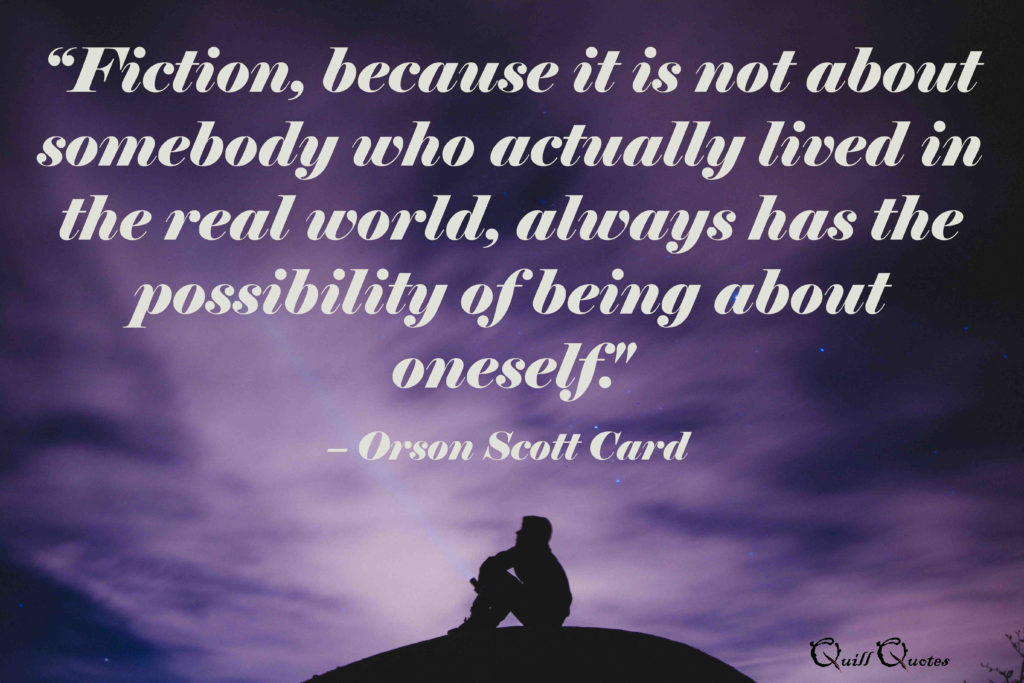When you think of learning from books, it is often textbooks, history, self-help, or other non-fiction that come to mind. So why read fiction? While fiction is typically viewed as reading for pleasure, there is still plenty to learn. Fiction allows you to place yourself in new situations and reflect on how you would react or feel.
“Fiction, because it is not about somebody who actually lived in the real world, always has the possibility of being about oneself.”
– Orson Scott Card

Imagine Yourself in the Story
As you read, imagine yourself in the story, as one of the characters or a passive observer. I believe most readers do this, at least on a subconscious level. In discussing this concept with my wife, we discovered I more often view myself as a character, while she is more a passive observer “watching” the story unfold.
One of my biggest measures of a great book is how well I connect with the characters and story. For instance, Ender’s Game resonates very strongly with me. As a kid who grew up in talented and gifted programs throughout school, with pressure to succeed and occasional resentment from classmates, I have no difficulty placing myself in Ender’s shoes (read more). The more emotionally engaged you are, the more you’ll learn.
With each new book, as you place yourself in different situations, you’ll form new viewpoints and opinions. Contemplate the character’s feelings and actions. Would you feel or do the same? Consider the outcome of the character’s actions. Is the outcome good or bad, desirable or to be avoided? Do you believe the author’s portrayal, is it the outcome you expected?
“Fiction is a particularly useful simulation because negotiating the social world effectively is extremely tricky, requiring us to weigh up myriad interacting instances of cause and effect. Just as computer simulations can help us get to grips with complex problems such as flying a plane or forecasting the weather, so novels, stories, and dramas can help us understand the complexities of social life.”
– Dr. Keith Oatley
Reflect on the Experiences from the Story
These imagined experiences expand our scope of understanding and enhance our sense of morality. Exploring the human condition and societal norms through fiction allows the realization of truths we are otherwise blind to. Very often, fiction addresses topics which are difficult to discuss and we prefer to avoid, such as death, fear, survival, loneliness, or oppression.
Encountering these topics through fiction is a much safer option and allows us to have experiences we may otherwise never have. You may find explanations to questions or feelings you didn’t know you had. Or, be better prepared to handle future events you never expected.
“We care about moral issues, nobility, decency, happiness, goodness—the issues that matter in the real world, but which can only be addressed, in their purity, in fiction.”
– Orson Scott Card
Apply What You Learn
In addition to learning about yourself, fiction also enhances our ability to understand other people. Not all characters and stories will apply directly to you, but will likely reflect someone you know or meet in the future. Experiencing aspects of lives different from your own by reading fiction is a great way to develop a better sense of empathy.
The more you read, the more you’ll discover about yourself and others. As your self-understanding grows, you will likely notice yourself becoming more insightful, less stressed, and happier with your relationships. If these benefits sound good to you, check out 8 Life Tips to Read More.
Each book has something to teach you, and the great ones might just revolutionize how you see yourself or the world around you.
Why Read Fiction Quotes
If you still aren’t convinced why fiction is good for you, I’ll leave you to ponder some more of my favorite quotes on the benefits of reading fiction books:
“Artists use lies to tell the truth. Yes, I created a lie. But because you believed it, you found something true about yourself.”
– Alan Moore, V for Vendetta
“You should never read just for “enjoyment.” Read to make yourself smarter! Less judgmental. More apt to understand your friends’ insane behavior, or better yet, your own. Pick “hard books.” Ones you have to concentrate on while reading. And for god’s sake, don’t let me ever hear you say, “I can’t read fiction. I only have time for the truth.” Fiction is the truth, fool! Ever hear of “literature”? That means fiction, too, stupid.”
– John Waters, Role Models
“Literature is a luxury; fiction is a necessity.”
– G.K. Chesterton
“While we read a novel, we are insane—bonkers. We believe in the existence of people who aren’t there, we hear their voices… Sanity returns (in most cases) when the book is closed.”
– Ursula K. Le Guin
“Just as pilots gain practice with flight simulators, people might acquire social experience by reading fiction.”
– Raymond A. Mar
“Fiction reveals truth that reality obscures.”
– Ralph Waldo Emerson
“A lie, sometimes, can be truer than the truth, which is why fiction gets written.”
– Tim O’Brien
Do you imagine yourself in the books you read? Which books have resonated with you the most and why? Please share in the comments below.
Leave a Reply